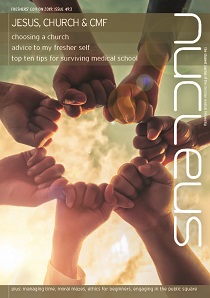You've just enjoyed a discussion on autonomy in an ethics seminar. During the coffee break your friend asks: 'You Christians seemed to have a lot to say in that session. What do you actually believe?' You've got five minutes. What do you say?
The motto 'Be Prepared' is important not only at Scouts (and in medicine), but it is also vital in evangelism. Many Christians memorise a 'gospel outline' to help — much like the way medics use mnemonics. But there are hundreds of gospel outlines around. Which one do you learn?
what makes a good gospel outline?
start in the right place
Many outlines assume too much — beginning with sin, for example, assumes not only that the listener knows God exists, but also understands his character. Not everyone now assumes that God is morally pure. Starting with a statement about the love of God makes assumptions about his existence and character. Begin further back. Affirm God as real, give a reason for such belief, and briefly describe him.
be Christ-centred
All too often Jesus features merely as a mechanism to solve a moral conundrum for a God who must work out how to reconcile his mercy with his justice. We can't ask people to trust Jesus if we don't tell them about him. The existence of Jesus as the primary reason for believing in God goes to the heart of God's revelation of himself, and helps to stop discussion getting bogged down in peripheral issues.
call for repentance
This is very often missed. It is not, after all, fashionable today. The term 'repent' is repeatedly used in the New Testament. (1 ) We must not only explain what 'repent' means, but also make clear that repentance is necessary.
the cross central, but not first
The cross is central, but other things must first be explained for it to be understood. It makes sense only with some understanding of the existence of God and his moral purity, human sinfulness, impending judgment, the deity of Christ, and the significance of a sinless one coming under God's judgment. People are saved when they trust in 'Jesus Christ and him crucified'. (1 Corinthians 2:2) We are saved not by our belief in a specific event, but when we put our trust in Jesus and the death he died.
faithfulness about judgment
In our earnest desire to avoid offence, judgment is often missed out. Occasionally we see the opposite approach, with judgment preached so strongly initially that no one listens. Neither approach is right. But we often err closer to the first.
If judgment is ignored, what is the point of the gospel? If we are not going to be called to account for how we have lived, why do we need forgiveness? Why did Jesus die on the cross if there is no judgment to save us from? Indeed, why bother with evangelism at all, if there is no judgment for sin anyway? Without the reality of judgment, any logic in the gospel collapses.
Jesus repeatedly warns of judgment - just look at the Sermon on the Mount. (2) We cannot accept his moral teaching, while trying to separate out the parts about judgment.
how to use 'God-Man-God'
The five points are succinct and adaptable; use them to build a one-minute answer or structure a whole hour's lecture (if anyone will listen for that long!). This outline is drawn from Know and Tell the Gospel by John Chapman, (3) which is well worth a read. Below I suggest some content for each part:
1. God (ruler)
God exists. He created the universe, (4) and sustains its very existence. (5) Humans were made for a relationship with him. God is holy (6) — that is, he is pure, perfect, and unable to look upon that which is not holy. We can know him because he has revealed himself through creation, through his dealings in history with the Jewish people, and most perfectly through the person of Jesus Christ. (7)
2. man (rebel)
God created humans to be holy, (8) like him. But none of us consistently live with God as our ruler and creator. (9) We assume (wrongly) that we can govern our own lives. This results in either wilful disobedience to God (sin), or plain ignorance of him. Both amount to rebellion against him. We deserve God's judgment, (10) and have no right to be in his presence or live in his kingdom.
3. God (rescuer)
God's love for us means that — despite our rebellion — he wants to rescue us from this judgment. (11) Only someone who has always lived consistently in obedience to God's commands could take that punishment in our place — everyone else deserves punishment. (12) Jesus is the only person to have lived a perfect life, free from rebellion against God. (13)
Sent to earth by God, Jesus' three years of public ministry culminated in his execution on a cross. When he died, he received the punishment we deserve for our rebellion against God. On the third day after his death, Jesus came back to life with a new, transformed body. It was not only a 'spiritual' resurrection, but a real and physical one.
Jesus showed that he was victorious over the power of sin. Jesus was given all authority in the universe by God. He is Lord over all things. He has taken the punishment we deserve, giving us an offer of forgiveness that demands a response.
Jesus' teaching invites us to repent (turn from our rebellion against God) and believe in him (to trust that he is God's Son and live in obedience to him). God is now waiting for our response to his offer.
4. what if I don't (rejection)
If we ignore or reject God's offer of forgiveness and reconciliation in Jesus, we remain banished from God's presence because of our rebellion. Nothing that we can do will repair our broken relationship with God. We will receive the judgment we deserve, and be cut off from God forever, in hell.
5. what if I do (reconciliation)
If we repent and believe that Jesus has taken our punishment upon himself, God forgives our wrongdoing. He treats us as if we had never rebelled in the first place! He forgives us for being rebels, and gives us the Holy Spirit, who enables us to live a life pleasing to him. The Holy Spirit is also a 'deposit' — a guarantee that we will spend eternity with God, adopted as his children. (14) We must choose now whether to accept God's offer, since only God knows when Jesus will return or when we will die, and tomorrow may be too late.
how to use it
A strength of this outline is that it can be adapted to so many situations. I've held it in mind during one-to-one conversations about Jesus in the past — I remember one as a medical student where it was as if the colleague I was speaking with had read the outline, given the questions he asked me (though don't rely on this always happening!).
It is also useful for a speaker at an event — a gospel talk constructed on these headings can easily get the important information into a couple of minutes or longer.
You might not use the whole outline every time; it usually takes several encounters with Christians for someone to come to faith, and your explanation of one area could be a key part of someone's journey. To learn more, and practise this outline, come along to a Confident Christianity day conference run by CMF — ask your local group leaders to organise one.
Confident Christianity
Do you ever feel that your evangelism skills could be honed? Do you long to get the gospel message through to your friends but struggle to communicate? Or perhaps you worry about the difficult questions that might get 'thrown at you' should you share your faith. This course is interactive, fun and highly relevant to students. Contact students@cmf.org.uk for more information.
Laurence Crutchlow is CMF Associate Head of Student Ministries and a GP in London
































